
"Don't Speak" is a song by American rock band No Doubt, featured on their third studio album, Tragic Kingdom (1995). Released as the album's third single in 1996 by Interscope Records, the song was initially written as a love song by lead singer Gwen Stefani and her brother, former band member Eric Stefani. However, after several revisions, Gwen reworked the lyrics into a breakup song, reflecting the end of her seven-year relationship with bandmate Tony Kanal.

"Discothèque" is a song by Irish rock band U2. It is the opening track on their 1997 album, Pop, and was released as its lead single on 3 February 1997 by Island Records. The song exhibits influences from electronic dance music, characteristic of the band's musical direction in the 1990s. The music video, directed by Stéphane Sednaoui, was set inside of a mirrorball and featured the band members dressed as members of the disco group the Village People.

"I Don't Wanna Cry" is a song recorded by American singer Mariah Carey for her first album Mariah Carey (1990). Written by Carey and producer Narada Michael Walden, Columbia Records released it as the album's fourth single in March 1991. A Latin soul–influenced pop ballad, the torch song describes the end of romance. It features drums, guitars, digital synthesizers, and a classic song structure with highly delineated section roles. Modulations occur between these segments that emphasize the singer's emotions. Varying from whispering to belting, Carey's vocal range spans more than two octaves.

"Don't Cry" is a song by American hard rock band Guns N' Roses, two versions of which were released simultaneously on different albums. The version with the original lyrics is the fourth track on Use Your Illusion I (1991), while the version with the alternate lyrics is the 13th track on Use Your Illusion II (1991). Only the vocal tracks differ, and even then only in the verses; however, in those verses, not only are the words entirely different, but the meter and melody are also slightly different. There is also a third version, officially released only on the single for the song, which was recorded during Appetite for Destruction sessions in 1986.
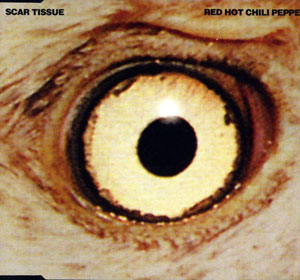
"Scar Tissue" is the first single from American rock band Red Hot Chili Peppers' seventh studio album, Californication (1999). Released on May 25, 1999, the song spent a then-record 16 consecutive weeks atop the US Billboard Hot Modern Rock Tracks chart as well as 10 weeks atop the Billboard Mainstream Rock Tracks chart, and it reached number nine on the Billboard Hot 100. It was also successful in Iceland, New Zealand, and Canada, reaching numbers one, three, and four, respectively. In the United Kingdom, it charted at number 15 on the UK Singles Chart.
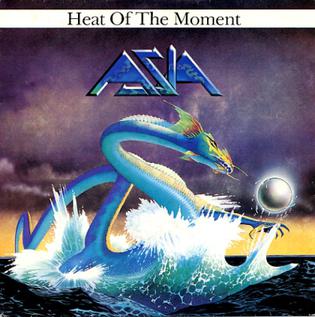
"Heat of the Moment" is the first single released by English progressive rock supergroup Asia from their 1982 eponymous debut album. It was written by singer and bass guitarist John Wetton and keyboardist Geoff Downes. It was named by Lee Zimmerman of Paste as Asia's signature song.
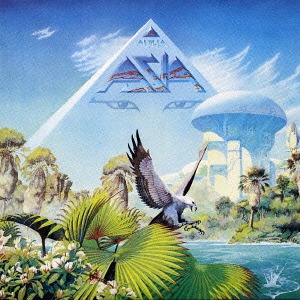
Alpha is the second studio album by British rock supergroup Asia, released on 12 August 1983 by Geffen Records. It was recorded at Le Studio in Morin-Heights, Quebec, and Manta Sound in Toronto from February to May 1983. Alpha adopted a notably more polished sound with radio-friendly elements and less emphasis on progressive rock sections. Like its multi-platinum predecessor, the album was produced by Mike Stone. It was also the last album to feature the band's original line-up for twenty-five years until Phoenix, which was released in 2008.

The English rock band Oasis have released seven studio albums, two live albums, five compilation albums, six video albums, one extended play, twenty seven singles which includes one double single, nineteen promotional singles and thirty-six music videos. As of 2024, the band has sold over 75 million records worldwide, making them one of the best-selling music artists of all time and been named by Guinness World Records as the most successful act in the United Kingdom between the years 1995 and 2005. Oasis had 22 consecutive UK top 10 hits between 1994 and 2008. Oasis was formed in 1991 by vocalist Liam Gallagher, guitarist Paul "Bonehead" Arthurs, bassist Paul "Guigsy" McGuigan and drummer Tony McCarroll – they were later joined by guitarist and songwriter Noel Gallagher. The band signed to Creation Records in May 1993 and released their debut single "Supersonic" the following year; it peaked at number 31 in the United Kingdom. Follow-up singles "Shakermaker" and "Live Forever" became UK top 15 hits, with the latter also attaining success in the United States. Definitely Maybe, the band's debut studio album, topped the UK Albums Chart and went on to be certified nine times platinum by the British Phonographic Industry (BPI).
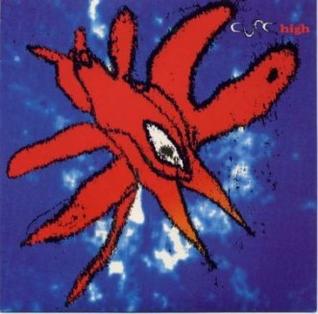
"High" is a song by English rock band the Cure, released as the lead single from their ninth album, Wish (1992), on 16 March 1992. The track received mostly positive reviews and was commercially successful, reaching number one on the US Billboard Modern Rock Tracks chart, number six on the Irish Singles Chart, and number eight on the UK Singles Chart. It charted within the top five in Portugal, where it peaked at number two, and in Australasia, reaching number five in Australia and number four in New Zealand; it is the band's highest-charting single in both countries.

"Friday I'm in Love" is a song by British rock band the Cure. Released as the second single from their ninth studio album, Wish (1992), in May 1992, the song became a worldwide hit, reaching number six in the UK and number 18 in the United States, where it also topped the Modern Rock Tracks chart. It also won the award for European Viewer's Choice for Best Music Video at the 1992 MTV Video Music Awards.

"Since I Don't Have You" is a song written and composed by Jackie Taylor, James Beaumont, Janet Vogel, Joseph Rock, Joe Verscharen, Lennie Martin, and Wally Lester. It was first a 1958 hit single for the doo-wop group the Skyliners on the Billboard Hot 100. Country music singer Ronnie Milsap had a hit with the song in 1991. American hard rock band Guns N' Roses also had some success in 1994 with their version of the song which reached the top 10 on the UK Singles Chart.
"Don't Know Much" is a song written by Barry Mann, Cynthia Weil and Tom Snow. Mann was the first to record the song in 1980, gaining a minor chart hit in the US. The song was made famous when it was covered as a duet by Linda Ronstadt and Aaron Neville in 1989. Their version was a worldwide success, topping the Irish Singles Chart and reaching the top 10 in several territories.

"Babe" is a song by the American rock band Styx. It was the lead single from the band's 1979 triple-platinum album Cornerstone. The song was Styx's first, and only, US number-one single, spending two weeks at No. 1 in December 1979, serving as the penultimate number-one single of the 1970s. "Babe" also went to No. 9 on the Adult Contemporary chart. It additionally held the number-one spot for six weeks on the Canadian RPM national singles chart, charting in December 1979 and becoming the opening chart-topper of the 1980s. It was also the band's only UK Top 40 hit, peaking at No. 6. It also reached No. 1 in South Africa.
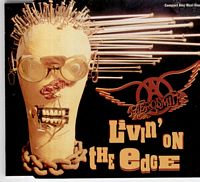
"Livin' on the Edge" is a song by American hard rock band Aerosmith. The song was written by Steven Tyler, Joe Perry, and Mark Hudson. It was released in March 1993 by Geffen Records as the first single from the band's commercially successful eleventh album, Get a Grip (1993). The single reached number 18 on the US Billboard Hot 100 chart, number three on the Cash Box Top 100, and number one on the Billboard Album Rock Tracks chart, where it remained for nine weeks. In the UK, the song peaked at number 19 on the UK Singles Chart in April 1993.

"Devil Inside" is a song by Australian rock band INXS. The song was written by Andrew Farriss and Michael Hutchence and was released as the second single from the band's sixth studio album, Kick, in February 1988. The song reached number two on the US Billboard Hot 100 chart for two weeks. "Devil Inside" also peaked at number six in Australia, number three in Canada, and number two in New Zealand. Cash Box said that the band "[uses] a Daytripper-like guitar sound and riff it under a sultry, breathy vocal to put the point across."

"Bad Medicine" is a song by American rock band Bon Jovi. It was written by Jon Bon Jovi, Richie Sambora, and Desmond Child, and was released on September 12, 1988, as the lead single from the band's fourth album, New Jersey (1988). The song reached number one on the US Billboard Hot 100, Bon Jovi's third single to do so, and became a top-10 hit in Australia, Canada, Finland, Ireland, the Netherlands, and New Zealand.

"In These Arms" is a song by American rock band Bon Jovi, released on May 3, 1993 by Mercury and Jambco, as the third single from the band's fifth studio album, Keep the Faith (1992). The song was written by band members Jon Bon Jovi, Richie Sambora and David Bryan, and produced by Bob Rock.
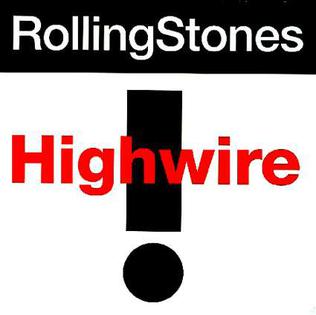
"Highwire" is an anti-war song by English rock band the Rolling Stones, featured on their 1991 live album, Flashpoint. Written by Mick Jagger and Keith Richards, the song is one of the rare examples of the Stones taking on political issues—in this case, the fall-out from Persian Gulf War.
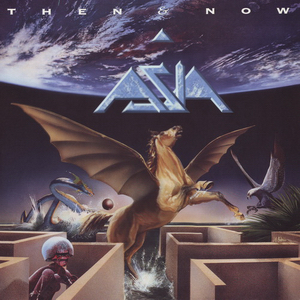
Then & Now is a compilation album by British rock supergroup Asia, released on 14 August 1990 by Geffen Records. It consists of two parts titled as Then and Now. Then comprises songs from the band's first two albums, Asia and Alpha, which featured the band's original line-up of Geoff Downes, Steve Howe, Carl Palmer, and John Wetton. Now comprises songs recorded by the band after Howe's departure.

"You Won't See Me Cry" is a song by American pop music group Wilson Phillips from their second studio album, Shadows and Light (1992). The song was released on April 28, 1992, by SBK Records. It was released as the lead single from the album, reaching No. 1 in Canada and Finland, No. 18 in the United Kingdom, and No. 20 on the US Billboard Hot 100. It was the group's last top-50 hit in most countries.




















